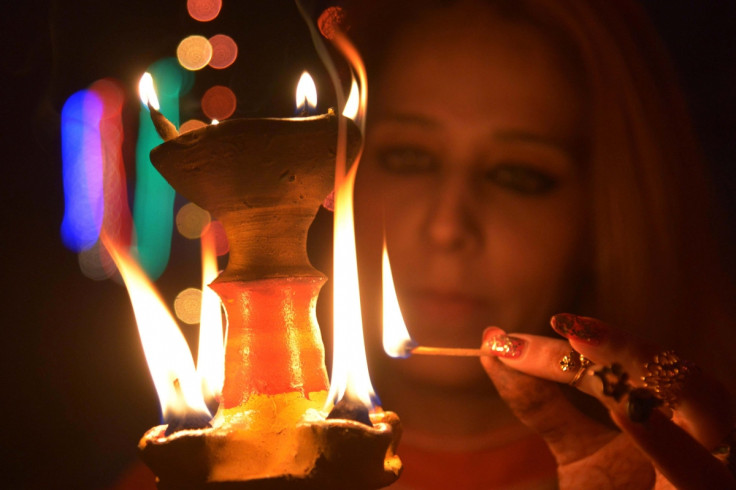Diwali 2015: The cultural and religious significance of the Hindu festival of lights

Today marks day one of the five-day celebration of Diwali – the Hindu festival of lights and India's most significant religious holiday. Diwali, derived from the Sanskrit Dipawali, translates to "rows of lighted lamps". The faithful across the globe will decorate homes, businesses and temples with diyas or small oil lamps. These signify the victory of light over darkness, the triumph of good versus evil, and hope over despair.
A short film in 2014 by Pepsi India, accompanied with the #GharWaliDiwali (Diwali at home) highlights the importance of family during the festival. The tear-jerking video emphasised the significance of "sharing the happiness" with parents, as Diwali is a time to renew family values, and a time for new beginnings. What started as a celebration of the harvest season, with farmers paying obeisance to Lakshmi, the goddess of prosperity and wealth, has become Hinduism's best-known religious festival.
Diwali holds a special place in the hearts of the Indian diaspora. Over the years, I've always seen Diwali as a time to take stock of life, while having at least for a few days an attitude of gratitude. Of course – it's also a moment to reflect on the past year, and look forward with optimism, even if things aren't quite going your way. It's heartwarming when people wish me a "shubh Diwali" – the last person do to this was a charming Gurkha, who had spend some years living in Punjab. Small gestures such as this breakdown barriers and inculcate a sense of kinship and solidarity.
The epic story of the Ramayana is the reason many both in India and here in the diaspora will be celebrating. According to Hindu legend, Rama and Sita returned to their kingdom in Ayodhya after 14 years in exile, following Rama's victory in battle against Sita's abductor, the demon Lankan King Ravana. On Rama's return and coronation as king, people decorated the entire city with earthen lamps to celebrate the vanquishing of Ravana. Rama's kingdom and rule (Ram-raj) represents the onset of what is seen by many as a golden age for civilisation.
The legends that accompany the festival vary according to the different regions of India. In Bengal, for example, it's associated with the goddess Kali, while in Nepal Lord Krishna's victory is over the demon king Narakasura. Although Diwali is best known as a Hindu festival, the day coincides with important events for some of Britain's other minority faiths, particularly Sikhs and Jains.
Professor Eleanor Nesbitt, from the University of Warwick, sits on the editorial board of Fieldwork in Religion and Religions of South Asia. She told me about Diwali's wider significance.
Nesbitt said: "It's a night for Hindus to remember Rama and Sita triumphantly returning to their Kingdom, for Jains to think of Mahavira attaining Nirvana, and for Sikhs to recall Guru Hargobind - many centuries later - securing the release of fellow prisoners as he left Gwalior gaol. Meanwhile, a smaller movement, the Arya Samajis, relate how their founder, Swami Dayanand Saraswati, passed away on this night."
For Sikhs, Diwali coincides with what is known as Bandi Chhor Divas, or "Day of Liberation". In 1619 on release from incarceration at the hands of Mughal authorities, the sixth Guru of Sikhism, Guru Hargobind, obtained the freedom of other prisoners from Gwalior gaol. The Emperor Jahangir decreed he would release only those who could hang on to the Guru's coat tails in order to limit numbers.
The Guru had a special garment made with 52 strings so all the prisoners could be set free with him. On his arrival in Amritsar, the entire Golden Temple complex was lit in celebration. The illumination of Sikhism's holiest shrine has since been the tradition. Standing for the human rights of all, not just the few being a central Sikh teaching.
Jains observe Diwali because it coincides with the night Lord Mahavir, the 24th and last Tirthankara (ford founder) achieved mokhsha, or liberation from the cycle of birth and death. Dr Harshad N Sanghrajka, deputy chairman of The Institute of Jainology, told me the festival elicits mixed emotions for Britain's 20,000 Jains.
He said: "On one hand, it is a sombre occasion that the world lost the spiritual light and this is observed by the congregation reciting mantras during the night of Diwali. On the other hand, it is an occasion to celebrate the liberation of Lord Mahavir."
Britain's 817,000-plus Hindus will be holding special ceremonies in mandirs across the country, which will include Lakshmi Puja – the offering of prayers to the goddess Lakshmi. Festivities will mark Nutun Varsh or New Year's Day, and will include extravagant firework displays, exchange of gifts along with the sharing of festive meals.
Celebrations in gurdwaras among Britain's 423,000 Sikhs will include the singing of Kirtan or hymns, and the sharing of langar, a vegetarian meal available to every visitor, all year round. Some British Sikhs have taken the decision not to light diyas or have fireworks displays this year, in solidarity with Sikhs who were recently killed and injured while peacefully protesting in India.
Hardeep Singh is a freelance journalist. Follow him on Twitter @singhtwo2.
© Copyright IBTimes 2025. All rights reserved.






















